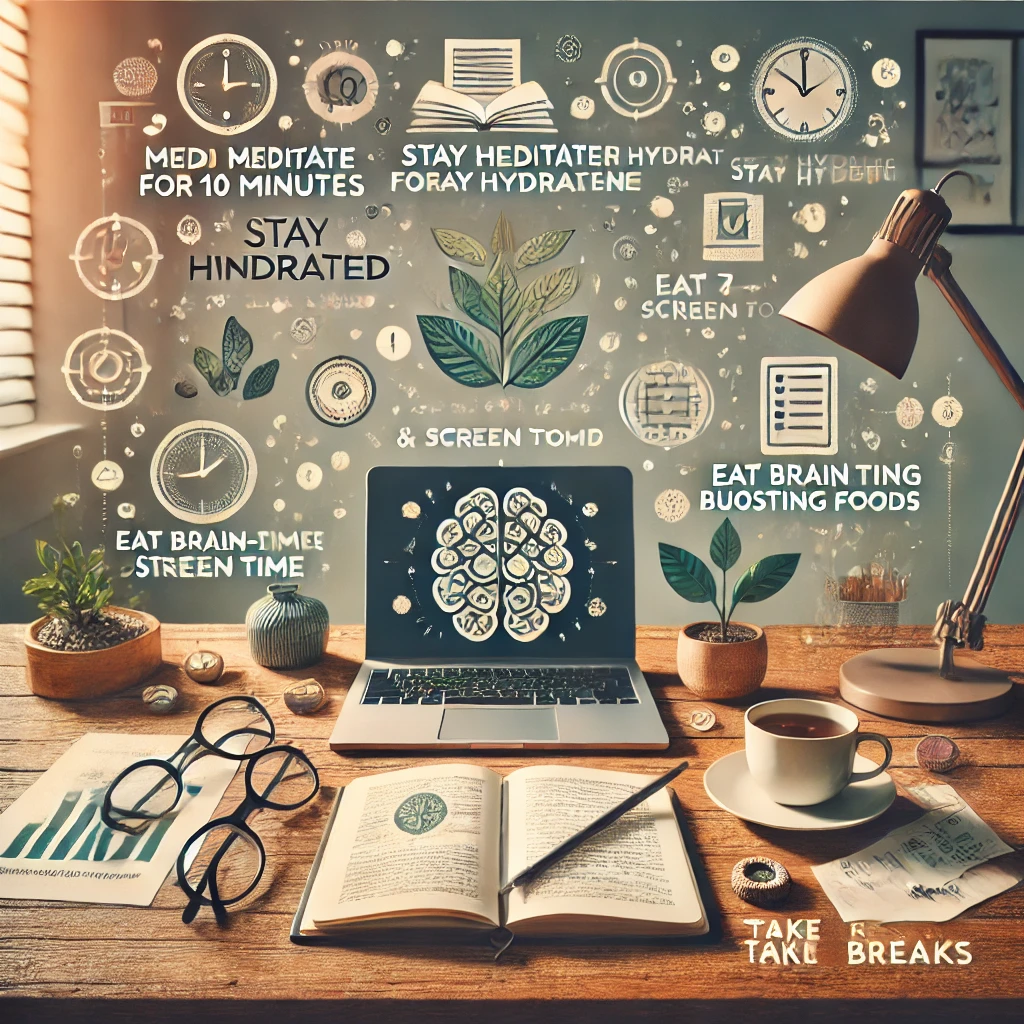
Health and Wellness
Daily Habits for Boosting Mental Clarity and Focus


DINKAR
10/28/2024
In our fast-paced world, staying mentally clear and focused can be challenging, especially with numerous distractions and information overload. Building daily habits that promote mental clarity and concentration is essential for enhancing productivity, creativity, and overall mental health. In this article, we’ll explore some effective daily practices to help you keep a sharp, focused mind throughout the day.
1. Start Your Day with Mindful Meditation
Practicing mindfulness meditation each morning helps clear your mind and set a calm, focused tone for the day. Just 5–10 minutes of meditation can significantly reduce stress, improve emotional resilience, and help you manage distractions more effectively.
- How to Start: Find a quiet space, close your eyes, and focus on your breathing. Each time a thought arises, acknowledge it without judgment and gently return your focus to your breath.
- Tip: Use a meditation app like Headspace or Calm to guide you through your sessions.
2. Get Moving with a Morning Workout
Exercise is not only good for your body but also for your mind. Physical activity increases blood flow to the brain and stimulates the release of endorphins, which improve mood and mental clarity.
- How to Start: Try a 20–30 minute routine, such as a brisk walk, yoga, or a quick cardio workout. Even light stretching can have a positive impact on mental clarity.
- Tip: Morning exercise helps you feel energized and ready to tackle the day’s challenges with a clear mind.
3. Prioritize a Nutritious Breakfast
A nutritious breakfast provides the brain with essential nutrients for optimal function. Foods rich in protein, fiber, and healthy fats, like eggs, oatmeal, and avocados, fuel the brain and prevent blood sugar spikes that can lead to brain fog.
- How to Start: Avoid sugary cereals or pastries in the morning. Opt for whole grains, fruits, and lean protein instead.
- Tip: Try adding a smoothie with leafy greens, berries, and a protein source for a brain-boosting breakfast.
4. Set Daily Goals and Intentions
Setting clear, achievable goals helps you stay focused throughout the day. Define three to five tasks you want to accomplish and prioritize them. This practice improves time management and keeps your mind on track.
- How to Start: Write down your top tasks for the day. Break down larger tasks into smaller, manageable steps.
- Tip: Use a planner or a productivity app like Todoist to stay organized.
5. Take Regular Breaks with the Pomodoro Technique
The Pomodoro Technique, a time-management method involving 25 minutes of focused work followed by a 5-minute break, is excellent for maintaining concentration. Regular breaks prevent mental fatigue and help you return to tasks with renewed clarity.
- How to Start: Set a timer for 25 minutes, focus on a task, and take a 5-minute break once the timer ends. Repeat this process four times, then take a longer break.
- Tip: Use a Pomodoro app or a kitchen timer to keep track of your intervals.
6. Stay Hydrated
Dehydration, even in mild forms, can lead to fatigue, brain fog, and decreased focus. Drinking enough water throughout the day helps keep your brain sharp and improves your ability to concentrate.
- How to Start: Aim for at least eight glasses of water daily or more if you’re active. Carry a reusable water bottle with you to remind yourself to stay hydrated.
- Tip: Infuse your water with lemon or mint if you find plain water boring.
7. Practice Digital Detox
Constant exposure to screens, whether from your phone, computer, or TV, can strain your eyes and exhaust your mind. A daily digital detox helps you regain focus and gives your mind the space to recharge.
- How to Start: Schedule screen-free breaks throughout your day. For example, avoid screens during meals or take a short walk without your phone.
- Tip: Avoid screens at least an hour before bedtime to improve sleep quality.
8. Challenge Your Mind with Brain Exercises
Activities like puzzles, reading, or even learning a new language can help keep your brain active and improve mental clarity over time. These exercises stimulate different areas of the brain, improving both focus and memory.
- How to Start: Dedicate 10–15 minutes daily to activities that challenge your brain, such as crossword puzzles, Sudoku, or a brain-training app like Lumosity.
- Tip: Mix up your activities to keep things interesting and engage different areas of your brain.
9. Get Sufficient Sleep
Sleep is crucial for mental clarity, focus, and overall cognitive health. Poor sleep can impair memory, decision-making, and the ability to handle stress. Aim for 7–8 hours of quality sleep each night.
- How to Start: Create a sleep routine by going to bed and waking up at the same time daily, even on weekends. Avoid caffeine and screens at least an hour before bed.
- Tip: Consider a relaxing pre-sleep ritual, like reading or taking a warm bath, to signal your body that it’s time to wind down.
10. Practice Gratitude and Positive Thinking
Maintaining a positive mindset can help clear mental clutter and improve focus. Practicing gratitude helps shift your perspective from what’s wrong to what’s going well, reducing stress and enhancing mental clarity.
- How to Start: Write down three things you’re grateful for each morning or evening. This simple habit can lead to lasting positive changes in how you view your day.
- Tip: Include small wins or positive interactions in your gratitude list for an added boost of positivity.
11. Limit Multitasking
While it may feel productive, multitasking often leads to lower productivity and greater mental fatigue. Focusing on one task at a time can improve your concentration and help you complete tasks more efficiently.
- How to Start: Set a specific time for each task, and resist the urge to switch between tasks. Instead of checking emails while working on a report, allocate separate times for each.
- Tip: Use a “Do Not Disturb” feature on your devices to minimize distractions.
12. Spend Time in Nature
Spending time outdoors, especially in green spaces, has been shown to reduce stress and improve mental clarity. Even a short walk outside can make a big difference in your ability to focus.
- How to Start: Take a 10–15 minute walk outside during breaks, or work near a window with natural light.
- Tip: Try “forest bathing” or simply sitting quietly in nature, which can be calming and refresh your mind.
Final Thoughts
Building habits that promote mental clarity and focus takes time and consistency. By incorporating these small but powerful practices into your daily routine, you’ll find yourself better equipped to manage stress, handle challenges, and maintain a clear mind. Remember, it’s all about progress, not perfection, so start with one or two habits and gradually build from there.